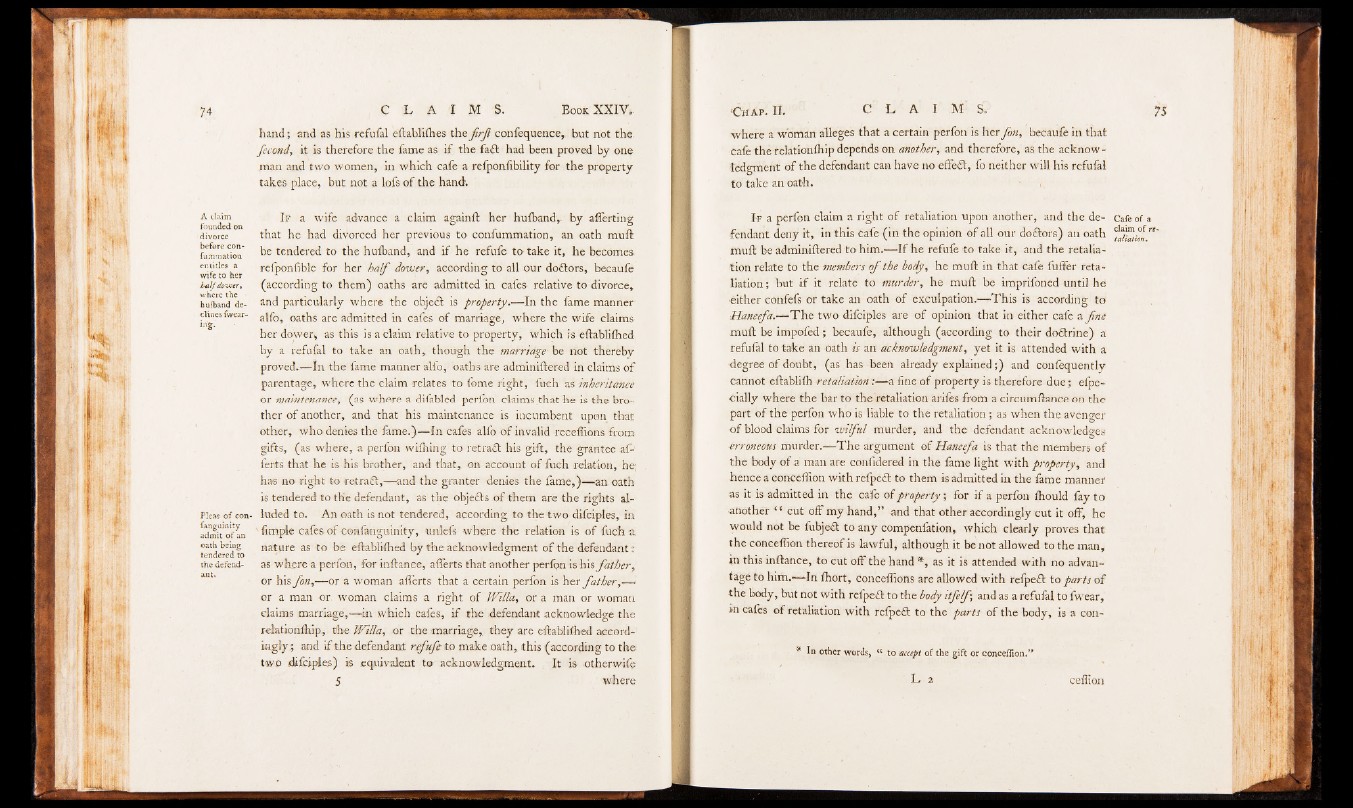
A claim
founded on.
divorce
before con-
fummation
entitles a
wife to her
half dower,
where the •
hufband declines
fwear-
in&.
Pleas o f con-
fanguinity
admit of an
oath being
tendered to
the defendant.
hand; and as his refufel eftablifhes the jir ji confequence,. but not the
fecond, it is therefore the feme as if the fail had been proved by one
man and two women, in which cafe a refponfibility for the property
takes place, but not a lofs of the hand.
If a wife advance a claim againft her hufband,. by aflerting
that he had divorced her previous to confummation, an oath muft
be tendered to the hufband, and if he refufe to take it, he becomes
refponfible for her h a lf dower, according to all our doftors, becaufe
(according to them) oaths are admitted in cafes relative to divorce*
and particularly where the objeft is property.— In the feme manner
alfo, oaths are admitted in cafes of marriage, where the wife claims
her dower, as this is a claim relative to property, which is eftablifhed
by a refufal to take an oath* though the marriage be not thereby
proved.— In the feme manner alfo, oaths are adminiftered in claims of
parentage, where the claim relates to feme right, fuch as inheritance
or maintenance, (as where a difebled perfon claims that he is the brother
of another, and that his maintenance is incumbent upon that
other, who denies the feme.)— In cafes alfo of invalid recefEons from
gifts, (as where, a perfon w idling to ref-raft his gift, the grantee af-
ferts that he is his- brother, and that, on account of fuch relation, he;
has no right to retraft,— and the granter denies the feme,)— an oath
is tendered to the defendant, as the objefts o f them are the rights alluded
to. An oath is not tendered, according to the two difc-i-pJes, in
' fimpie cafes of confenguinky, unlefe where the relation is of fuch a.
nature as to be eflablifhed by the acknowledgment of the defendant:
as where a perfon, for inftanee, afierts that another perfon is his father,
or his fon ,— or a woman afierts that a certain perfon is her father,— i
or a man or woman claims a right of Willa, or a man or woman
claims marriage,— in which cafes, if the .defendant acknowledge the
redationfhip, tlhe Willa, or the marriage,, they are eflablifhed aecord-
iagly* and if the defendant rtfufe to make oath, this (according to the
two difciples) is equivalent to acknowledgment. It is otherwife
5 where
where a woman alleges that a certain perfon is her fon, becaufe in that
Cafe thetelationfhip depends on another, and therefore, as the acknowledgment
of the defendant can have no effect, fo neither will his refufal
to take an oath.
I f a perfon claim a right of retaliation upon another, and the defendant
deny it, in this cafe (in the opinion of all our doftors) an oath
muft be adminiftered to him.— If he refufe to take it, and the retaliation
relate to the members o f the body, he muft in that cafe luffer retaliation
; but i f it relate to murder, he muft be imprifoned until he
•either confefs or take an oath of exculpation.— This is according to
Haneefa.— T h e two difciples are of opinion that in either cafe a fine
muft be impofed; becaufe, although (according to their doctrine) a
refufel to take an oath is an acknowledgment, yet it is attended with a
•degree of doubt, (as has-been already explained;) and confequently
cannot eftablifh retaliation :—-a fine o f property is therefore due; efpe-
cially where the bar to the retaliation arifes from a circumftance on the
part of the perfon who is liable to the retaliation; as when the avenger
o f blood claims for w ilful murder, and the defendant acknowledges
erroneous murder.— The argument of Haneefa is that the members of
the body of a man are confidered in the feme light with property, and
hence a conceffion with refpeft to them is admitted in the fame manner
as it is admitted in the cafe of property; for if a perfon fhould fay to
another *1 cut off my hand,” and that other accordingly cut it off, he
would not be fubjeft to any compenfetion, which clearly proves that
the conceffion thereof is lawful, although it be not allowed to the man,
fo this inftanee, to cut off the hand * , as it is attended with no advantage
to him.'—‘In fhort, conceffions are allowed with refpeft to parts of
the body, but not with refpeft to the body itfe fi and as a refufel to ifwear,
ki cafes of retaliation with refpeft to the parts of the body, is a con-
* In other words, “ to accept of the gift or conceflion.”
L 2
Cafe ö f a
claim o f re~
foliation.
ceflion